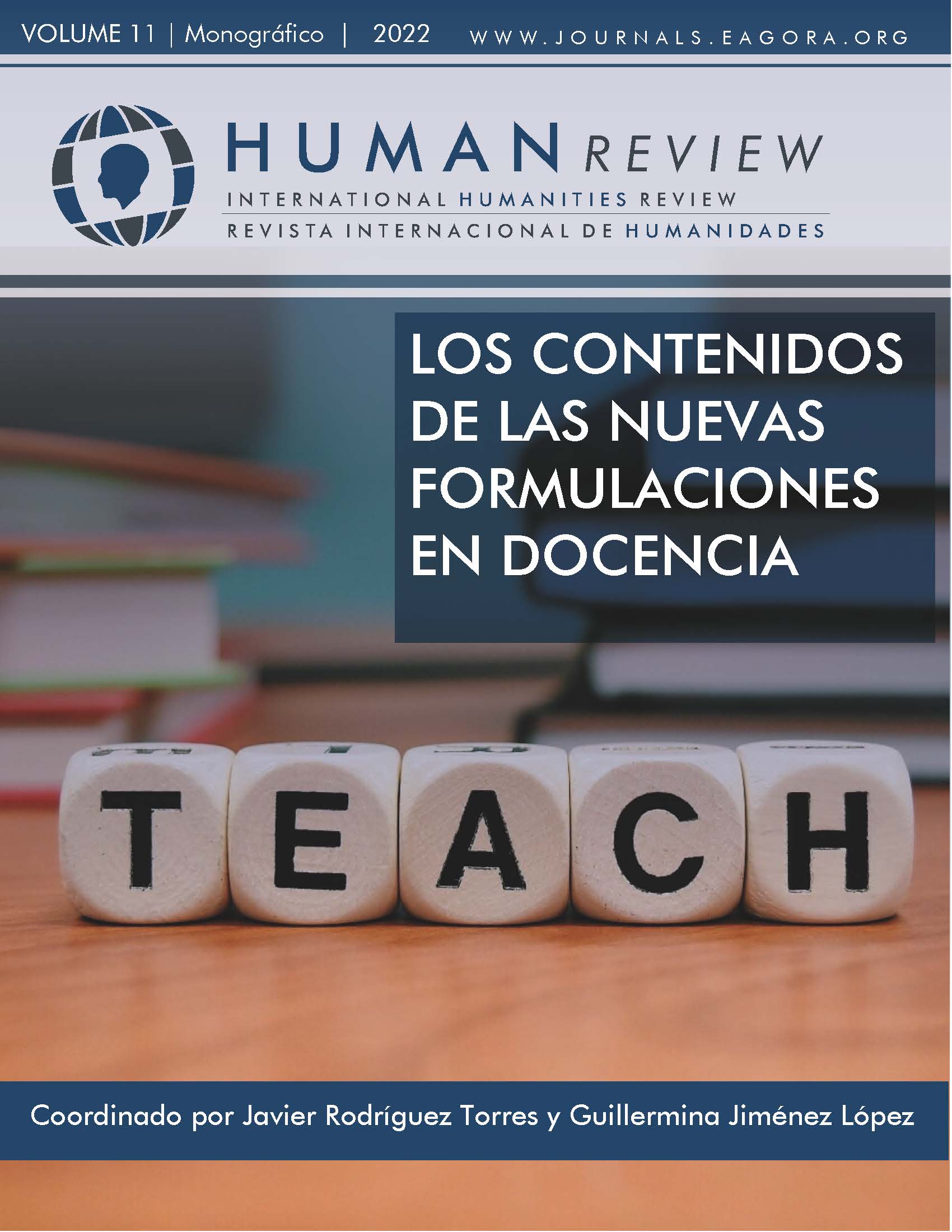What skills should a future teacher develop during their time at university?
Perception of student teachers on ente- ring their initial teacher training programmes
DOI:
https://doi.org/10.37467/revhuman.v11.3836Keywords:
effective teachers, initial teacher training, teaching skills, preservice teachers, students’ opinionsAbstract
The aim was to identify the skills that good teachers should have from the perception of future teachers. A total of 1047 responses from student teachers entering university in 2021 and 2022 were analysed. The results show that future teachers consider the development of ethics and responsibility, empathy and managing student behaviour in the classroom as the most important skills to develop at university. It is concluded that having interaction skills is more important than conceptual mastery to be a good teacher according to this group of preservice teachers.
References
Álvarez-García, D., Rodríguez, C., González- Castro, P., Núñez, J., Álvarez, M. (2010) La formación inicial
futuros maestros en recursos para la convivencia escolar y el manejo del aula. European Journal of Education and Psychology. 3(2) 187-198 https://doi.org/10.1989/ejep.v3i2.59 DOI: https://doi.org/10.30552/ejep.v3i2.56
Arancibia, V., & Álvarez, M. I. (1994). Características de los profesores efectivos en Chile y su impacto en
el rendimiento escolar y autoconcepto académico. Psykhe, 3(2). http://publicaciones.revistasteiniana.uc.cl/index.php/psykhe/article/view/20183
Clark, S. & Byrnes, D. (2015) What Millennial Preservice Teachers Want to Learn in Their Training. Journal of Early Childhood Teacher Education. 36:4, 379-395, DOI: 10.1080/10901027.2015.1100148 DOI: https://doi.org/10.1080/10901027.2015.1100148
Chen, H., Li, M., Ni, X., Zheng, Q., Li, L. (2021) Teacher effectiveness and teacher growth from student ratings: An action research of school-based teacher evaluation. Studies in Educational Evaluation. (70) 101010 https://doi.org/10.1016/j.stueduc.2021.101010 DOI: https://doi.org/10.1016/j.stueduc.2021.101010
Centro de Perfeccionamiento, Experimentación e Investigaciones Pedagógicas. (2021) Estándares de la profesión docente. Marco para la buena enseñanza. https://estandaresdocentes.mineduc.cl/wp-content/ uploads/2021/08/MBE-2.pdf
Emmer, E., Stough, L. (2010) Classroom management: A critical part of educational psycology, with implications for teacher education. Educational Psychologist 36(2) 103-112 https://doi.org/10.1207/ S15326985EP3602_5 DOI: https://doi.org/10.1207/S15326985EP3602_5
Garmon, M. (2004) Changing preservice teachers’ attitudes/beliefs about diversity: What are the critical factors? DOI: https://doi.org/10.1177/0022487104263080
Journal of Teacher Education. 55(3):201-213. https://doi.org/10.1177/0022487104263080 Good, T., Brophy, J. (2008) Looking in classrooms. Tenth edition. Pearson. United States of America.
Hernández, R., Fernández, C., Baptista, P. (2003) Metodología de la de la investigación. Tercera Edición Mc Graw Hill
Jaber, L., Southerland, C., Dake, F. (2018) Cultivating epistemic empathy in preservice teacher education. Teaching and Teacher Education. 72: 13-23 https://doi.org/10.1016/j.tate.2018.02.009 DOI: https://doi.org/10.1016/j.tate.2018.02.009
Jeder, D. (2013) Teachers’ Ethic Responsibilities in the Practice of Education and Training. Procedia. Social and Behavioral Sciences. (92) 432-436 https://doi.org/10.1016/j.sbspro.2013.08.697 DOI: https://doi.org/10.1016/j.sbspro.2013.08.697
Kagan, D. (1992) Professional Growth among preservice and beginning teachers. Review of Educational Research.
;62(2):129-169.https://doi.org/10.3102/00346543062002129 DOI: https://doi.org/10.3102/00346543062002129
Kruea-In, N. & Kruea-In, C. (2015) Pre-service teachers’ responses to ethical situations related to teaching practice. DOI: https://doi.org/10.1016/j.sbspro.2015.07.290
Procedia- Social and Behavioral Science. 197: 988-992 https://doi.org/10.1016/j.sbspro.2015.07.290 Rodríguez- Saltos, E., Moya-Martínez, M., Rodríguez- Gamez, M. (2020) Importancia de la empatía docente-
estudiante como estrategia para el desarrollo académico. Dominio de las Ciencias. 6(2) 23-50 http:// dx.doi.org/10.23857/dc.v6i3.1205
Seidel, T., Shavelson, R. (2007) Teaching effectiveness research in the past decade: the role of theory and research design in disentangling meta-analysis results. Review of Educational Research. 77(4) 454-499 https:// doi.org/10.3102/0034654307310317 DOI: https://doi.org/10.3102/0034654307310317
Simpson, A., Day, C. Goulding, J. Asha, J. (2022) Australian teachers’ perceptions on effectiveness in a performative culture. Teaching and Teacher Education. 109: 103542 https://doi.org/10.1016/j.tate.2021.103542 DOI: https://doi.org/10.1016/j.tate.2021.103542
Stronge, J. (2007) Qualities of effective teachers. 2nd edition. Association for supervision and curriculum development. The United States of America.
Weinstein, C. (1989) Teacher education students’ preconceptions of teaching. Journal of Teaching Education.
(2):53-60. https://doi.org/10.1177/002248718904000210 DOI: https://doi.org/10.1177/002248718904000210
Witcher, A., & Onwuegbuzie, A. J. (1999). Characteristics of Effective Teachers: Perceptions of Preservice Teachers. https://files.eric.ed.gov/fulltext/ED438246.pdf
Downloads
Published
How to Cite
Issue
Section
License
Those authors who publish in this journal accept the following terms:
- Authors will keep the moral right of the work and they will transfer the commercial rights.
- After 1 year from publication, the work shall thereafter be open access online on our website, but will retain copyright.
- In the event that the authors wish to assign an Creative Commons (CC) license, they may request it by writing to publishing@eagora.org









